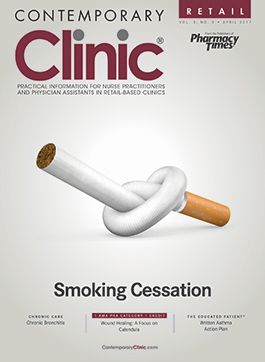COPD in the Retail Clinic
When retail health care providers see COPD patients, they should monitor comorbidities, refer patients when problems arise, and adjust medication when current treatment appears to be failing.
When retail health care providers see COPD patients, they should monitor comorbidities, refer patients when problems arise, and adjust medication when current treatment appears to be failing. Even if patients have comorbidities, clinicians must manage COPD in the same way and as simply as possible because simple regimens improve adherence.
Immunization is a critical preventive measure. The GOLD guideline recommends pneumococcal vaccine, which may reduce mortality. It also recommends influenza vaccine, which may reduce acute COPD exacerbations. With the recent increase in cases of pertussis across the country, vaccinating against this illness is also reasonable.
Choice of inhaler is important because many patients struggle with inhalers. GOLD 2017 emphasizes ensuring that patients use inhaler devices correctly and addressing poor adherence or correcting inhaler technique early. The guideline highlights initiating treatment with either a long-acting muscarinic antagonist or a long-acting beta2-agonist. If symptoms or exacerbations persist, it steps up to combination treatment. One change is new: GOLD 2017 acknowledges the growing indecision about high-dose inhaled corticosteroids as evidence accumulates to confirm the adverse effects of these corticosteroids.
stTM
Inhalers are drug-device combinations (DDCs), and clinicians need to ensure that patients can use them appropriately. Available DDCs require some degree of eyesight-and-hand coordination, but older individuals often have difficulty with vision, dexterity, and grip strength. Clinicians must consider each patient’s limitations and select the appropriate device. Manufacturers market 3 main types of inhalers: meter dose inhalers (MDI), dry powder inhalers (DPI), and a newer Soft Mitechnology. In addition, a new type of DPI called the Ellipta® inhaler was introduced in 2013 (FDA, 2015). Each has pros and cons.
Guideline-based treatment for COPD has proven benefits. It improves lung function, symptoms, exercise tolerance, and quality of life. It also reduces the number of exacerbations and hospitalizations.

